
Posted on 12/02/2013 5:07:58 PM PST by Dysart
Cats, according to new research, recognize their owner’s voice. They just can’t be bothered to react to it.
Researchers in Japan arrived at this conclusion after performing experiments with twenty house cats. They played recordings of the cats’ owners’ calling to their pets in whatever cat-talk voice they typically used. They also played recordings of three strangers calling to the cats, using the same words.
To quantify the cats’ reactions, the researchers recorded how often cats moved their head, tail, paws or ears, or whether they meowed or dilated their pupils. While the cats showed a significantly greater response to their owners calling their names than to strangers doing so, they did not bother to get up in either instance, the researchers found.
As the Independent explains, the authors think cats’ dismissive attitudes are a product of their evolutionary history over the past 9,000 years:
As early societies developed agriculture, these cats moved in to prey on the rodents that were attracted to stores of grain. In the words of the paper’s authors, they effectively “domesticated themselves”.
“Historically speaking, cats, unlike dogs, have not been domesticated to obey humans’ orders. Rather, they seem to take the initiative in human–cat interaction.” This is in contrast to the history of dogs and humans, where the former has been bred over thousands of years to respond to orders and commands. Cats, it seems, never needed to learn.
Read more: http://blogs.smithsonianmag.com/smartnews/2013/12/cats-recognize-their-owners-voice-but-chose-to-ignore-it/#ixzz2mMyn7FKZ Follow us: @SmithsonianMag on Twitter
(Excerpt) Read more at blogs.smithsonianmag.com ...
Some species of Lemur, I take it? Your posting was quite vague.
Slow Loris, I think.
Well, it has Lemur-like eyes, if not the markings I am used to...
you’re a goner :). Congratulations on your new, little girl.
Then again, the Ojibwa (Chippewa) native north american tribes also had some similar-sounding names for their familiar animals, if I recall correctly.
My husband gets up of course to reinforce the behavior (because what would it be like to sleep in every once in awhile? ). He puts out treats and new food and where's the cat? In that time the furry beast has made his way bacl down the hall to crawl back in bed cuddled up next to me. The cat will eat later!! My husband comes back to bed to the soft snores of the curled up kitty. lol
lol.
Thank you for that kind thought. Only the living can know sorrow. But, better to have loving memories than to have nothing.
ooh. very sweet and very sad what you said. beautiful, vulnerable animal.
What my very large Maine Coon usually wants is my complete and uninterrupted attention. My lap. Whatever’s in my cereal bowl. And scrinchies.
Yes. Slow Loris.
Yes. I am sure they are both smiling down upon you now. :)

I named my cat the sound a can opener makes.
He comes when I call him.
Here's a few more:
Now you can see why these poor little things are being hunted down to export as pets. Sad
*snicker* Thanks for that. But the tail is wrong. Take it from an expert. *grin*
So, you’re saying the cat has trained your hubby to get out of bed at 3:30 a.m. and be busy with something else while the cat sneaks back and takes his place on the warm spot in the bed??? Is that about right? Something tells me this has NOTHING to do with kitteh’s appetite! ;o)
People have been known to breed tigers and even bears as pets -both of which will eat humans if they decide to. And as for rats, well, I know what I say when I tell you that if you pass away anywhere near a "pet" rat you had better pray that someone finds you quickly or there will not be much to identify you with as time goes on.
This species seems quite likeable and non-dangerous. What's the bloody problem then?

Isn't this the prettiest horse you've ever seen:
Adorable puppy:
Disclaimer: Opinions posted on Free Republic are those of the individual posters and do not necessarily represent the opinion of Free Republic or its management. All materials posted herein are protected by copyright law and the exemption for fair use of copyrighted works.